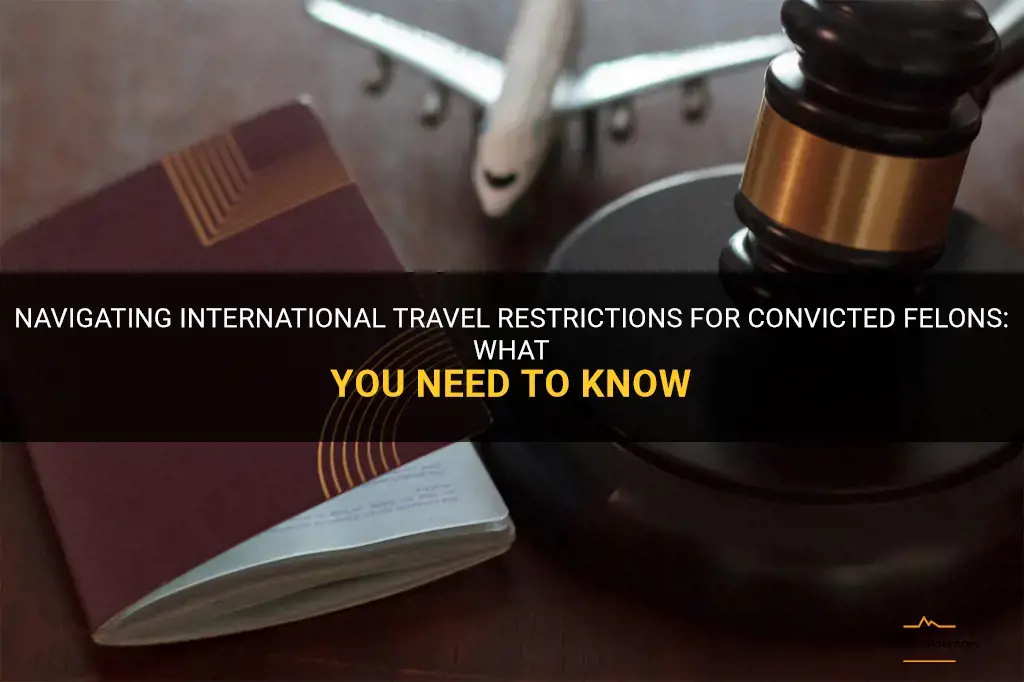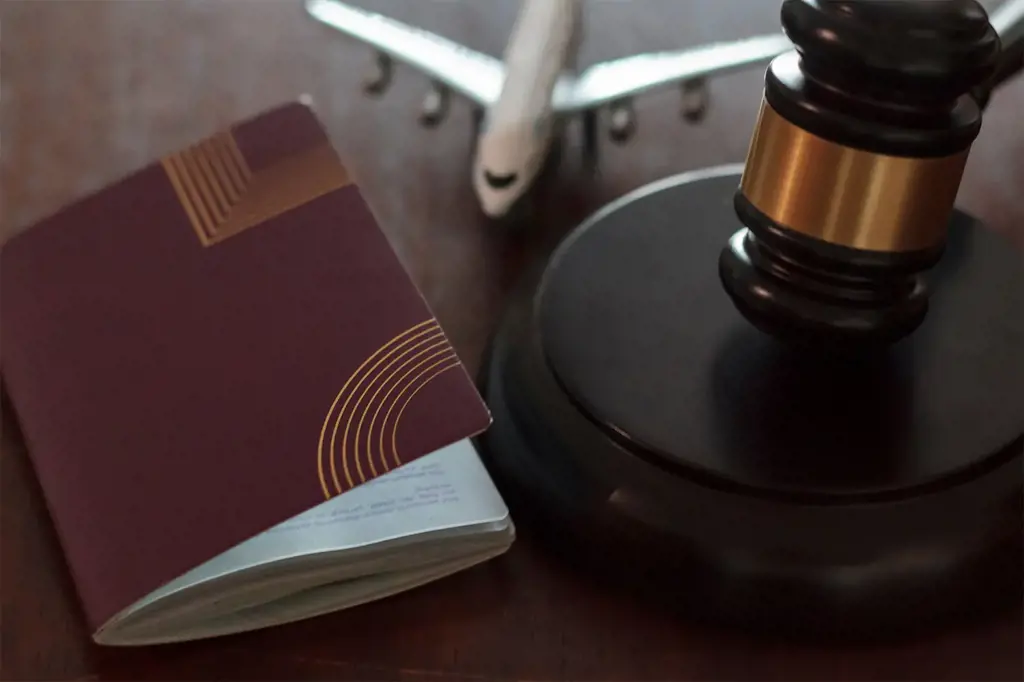
International travel can be a thrilling experience, allowing individuals to explore new cultures, indulge in exotic cuisine, and create lifelong memories. However, for convicted felons, embarking on an international journey can come with numerous obstacles due to strict travel restrictions. These limitations, imposed by different countries around the world, pose unique challenges for individuals with a criminal past, dashing their hopes of venturing beyond their national borders. In this article, we will delve into the complexities surrounding international travel for convicted felons, exploring the factors that contribute to these restrictions and the potential consequences they entail. Whether you're a convicted felon curious about your travel options or simply intrigued by the intricacies of global travel regulations, join us as we navigate the fascinating world of international travel restrictions for those with a criminal record.
What You'll Learn
- Which countries have strict international travel restrictions for convicted felons?
- What are some common types of felony offenses that can result in travel restrictions?
- Are there any circumstances under which a convicted felon may still be able to travel internationally?
- How can a convicted felon find out if they are eligible to have their travel restrictions lifted?
- Are there any countries that have more lenient international travel restrictions for convicted felons?

Which countries have strict international travel restrictions for convicted felons?

Strict international travel restrictions for convicted felons vary across different countries. While some countries may have more lenient policies, others impose strict rules and limitations on individuals with a criminal record. Here, we will explore some countries with stringent international travel restrictions for convicted felons.
The United States is one of the countries that have robust travel restrictions for convicted felons. The US government requires all travelers, including those with criminal records, to obtain a visa before entering the country. Convictions for certain crimes, such as drug offenses or crimes involving moral turpitude, can make individuals ineligible for a visa. Furthermore, individuals with a criminal background may be subjected to more extensive screenings and prolonged processing times.
Canada is another country with strict international travel restrictions for convicted felons. The Canadian immigration system assesses the criminal history of individuals applying for entry into the country. Convictions for offenses such as assault, sexual offenses, or drug trafficking can make individuals inadmissible. In some cases, individuals may be deemed inadmissible even if they have completed their sentences or received pardons.
Australia is known for its meticulous visa application process, including thorough character assessments. Individuals with a criminal record may be subject to additional scrutiny, and some convictions can lead to a refusal of entry. Serious offenses, such as sexual offenses, violent crimes, or drug-related offenses, can result in a person being denied a visa or a cancellation of an existing visa.
The United Kingdom also has strict travel restrictions for convicted felons. The UK Immigration Rules make it clear that individuals with certain criminal convictions are likely to be refused entry. Serious offenses, including those involving violence or drugs, can make individuals ineligible for entry clearance or lead to deportation if discovered after arrival.
Additionally, countries such as New Zealand, South Africa, and Singapore also have strict travel restrictions for convicted felons. These countries assess the character and criminal records of individuals applying for visas or entry. Convictions for serious offenses can lead to denial of entry or restrictions on travel.
It is important to note that the specific rules and regulations regarding travel restrictions for convicted felons may change over time, and it is always advisable to consult with the relevant embassy or consulate for the most up-to-date information.
In conclusion, several countries have strict international travel restrictions for convicted felons. These restrictions can vary, but generally, countries assess the criminal records of individuals applying for entry and may deny visas or entry to those with certain convictions. It is crucial for individuals with criminal records to research and understand the travel restrictions of their desired destinations before planning any international travel.

What are some common types of felony offenses that can result in travel restrictions?

If you have been convicted of a felony offense, it is possible that you may face travel restrictions. These restrictions can vary depending on the specific offense and the laws of the country you are in. While it is important to consult with a legal professional for personalized advice, here are some common types of felony offenses that can result in travel restrictions.
- Drug-related offenses: Felony drug offenses, such as drug trafficking or possession with intent to distribute, can lead to travel restrictions. Different countries have various measures in place to combat drug-related crimes, and this may include denying entry to individuals with drug convictions.
- Violent crimes: Felony offenses involving violence, such as murder, assault, or robbery, can also result in travel restrictions. Countries are cautious about allowing individuals with violent criminal records to enter, as they may pose a threat to public safety.
- Sexual offenses: Convictions for felony sexual offenses, including rape, child pornography, or sexual assault, can lead to travel restrictions. Many countries have strict laws and regulations when it comes to allowing individuals convicted of sexual offenses to enter their borders.
- Terrorism-related offenses: Felonies related to terrorism, such as providing support to terrorist organizations or plotting terrorist acts, can result in travel restrictions. Governments are particularly vigilant about preventing individuals with ties to terrorism from entering their countries.
- White-collar crimes: Certain white-collar crimes, such as fraud, embezzlement, or money laundering, can also lead to travel restrictions. These types of offenses are often viewed as serious crimes that can have significant financial impacts, and countries may limit the travel of individuals convicted of such offenses.
It is important to note that travel restrictions can vary greatly depending on the country you are in or wish to travel to. Some countries may have more lenient policies, allowing individuals with certain convictions to enter under certain conditions, while others may have strict zero-tolerance policies. Additionally, travel restrictions can also be temporary or permanent, depending on the offense and the laws of the country.
If you have been convicted of a felony offense and are concerned about travel restrictions, it is essential to consult with a legal professional who specializes in this area. They will be able to provide you with specific guidance based on your individual circumstances and help you understand the possible options available to you.
Navigating the New Normal: Exploring the Impact of Border Travel Restrictions
You may want to see also

Are there any circumstances under which a convicted felon may still be able to travel internationally?

For convicted felons, the ability to travel internationally may be limited, but in some circumstances, it is still possible. Various factors, such as the severity of the felony, the country of travel, and the specific travel restrictions imposed, play a significant role in determining whether a convicted felon can travel abroad. While it is generally challenging for felons to travel internationally, there are a few scenarios where they may be granted permission.
Expungement or Pardon:
If a felony conviction is expunged or a felon is granted a pardon by the relevant authority, their criminal record may no longer be visible to immigration officials. This can potentially enable them to travel internationally without the scrutiny associated with a criminal conviction.
Special Circumstances:
In some cases, there may be special circumstances that allow a convicted felon to travel internationally. For example, individuals may be granted permission if they need to travel for medical treatment, family emergencies, or official government/business purposes. However, approval in such cases is granted on a case-by-case basis, and strict conditions may be imposed.
Visa and Entry Requirements:
Each country has its own set of entry requirements and restrictions based on criminal backgrounds. Convicted felons must thoroughly research the specific visa and entry requirements of their desired destination. Some countries may deny entry to individuals with a history of criminal convictions, regardless of the circumstances or severity of the offense. Others may allow entry but require additional documents, such as a visa, character references, or a clean criminal record certificate.
Time Passed Since Conviction:
Over time, some countries may loosen travel restrictions for individuals with past felony convictions, especially if they have successfully completed their sentence and demonstrated rehabilitation. The length of time that has passed since the conviction, the individual's behavior since then, and their overall rehabilitation efforts are often considered.
Pre-Approval and Advanced Planning:
To increase the chances of being able to travel internationally, convicted felons should seek pre-approval or clearance from the relevant authorities well in advance. This may involve submitting an application, supporting documents, and undergoing an evaluation process. Timely planning and proactive communication with the appropriate authorities can help streamline the travel approval process.
It is important to note that even if a convicted felon is allowed to travel internationally, they may still face challenges during the entry and exit process. Immigration officials may subject them to additional questioning, scrutiny, or even denial of entry. Therefore, it is crucial for convicted felons to understand the potential risks and prepare accordingly, seeking guidance from legal professionals if needed.
In conclusion, while it can be challenging for convicted felons to travel internationally, there are circumstances where it is still possible. Factors such as expungement or pardons, special circumstances, visa and entry requirements, time passed since conviction, and proactive planning all play a role in determining whether a convicted felon can travel abroad. However, it is recommended for felons to consult legal counsel and thoroughly research the entry requirements of the destination country before making any travel arrangements.
The Impact of Air Travel Restrictions on Alcohol Consumption
You may want to see also

How can a convicted felon find out if they are eligible to have their travel restrictions lifted?

If you are a convicted felon and want to travel but are unsure if you are eligible to have your travel restrictions lifted, there are a few steps you can take to find out.
The first step is to review your sentencing documents and any other legal paperwork related to your conviction. Look for any specific mention of travel restrictions or probationary conditions that may prohibit you from leaving the country or traveling to certain areas. This information will help you understand your current limitations and determine if you are eligible to have them lifted.
Next, consult with an attorney who specializes in criminal law or post-conviction relief. They can review your case and provide guidance on whether or not you are eligible to have your travel restrictions lifted. They will also be able to advise you on the necessary steps to take in order to request the lifting of these restrictions.
In some cases, you may need to petition the court to have your travel restrictions lifted. Your attorney can help you prepare the necessary documents and guide you through the legal process. It is important to provide a strong argument as to why your travel restrictions should be lifted, such as demonstrating that you have completed your sentence, maintained good behavior, and have a legitimate reason for needing to travel.
If you are currently serving probation or parole, you will likely need to work with your probation or parole officer to request permission to travel. They will review your request and make a determination based on factors such as the nature of your conviction, your compliance with the terms of your supervision, and the potential risks involved in granting you permission to travel.
It is important to note that the process of having your travel restrictions lifted can vary depending on the jurisdiction and the specifics of your case. It is crucial to consult with an attorney who is familiar with the laws and procedures in your area to ensure you are following the correct process.
In conclusion, if you are a convicted felon and want to have your travel restrictions lifted, start by reviewing your sentencing documents and consulting with an attorney. They can help you determine if you are eligible and guide you through the necessary steps to request the lifting of these restrictions.
Exploring the Implications of Travel Restricted Laws: A Comprehensive Analysis
You may want to see also

Are there any countries that have more lenient international travel restrictions for convicted felons?

For individuals with a criminal record, international travel can often pose significant challenges. Many countries have strict entry requirements and may deny entry to individuals with a conviction, particularly for serious offenses. However, there are a few countries that have more lenient travel restrictions for convicted felons.
One such country is Canada. In general, Canada does not deny entry to individuals solely based on a criminal record. However, certain offenses may still make a person inadmissible to Canada, such as offenses involving serious violence or organized crime. To determine admissibility, individuals with a criminal record may need to apply for a Temporary Resident Permit or Rehabilitation.
Australia is another country that has a relatively lenient approach towards convicted felons. While Australia does have restrictions on individuals with a criminal record, in some cases, it may be possible to obtain a Character Waiver. This waiver allows individuals to enter Australia despite their criminal history under certain circumstances. Each case is assessed individually, and individuals must demonstrate that they no longer pose a risk to the Australian community.
Mexico is also known to have more lenient travel restrictions for convicted felons. Generally, Mexico does not require a criminal background check for entry, and individuals with a criminal record are allowed to visit the country. However, it is important to note that certain offenses, such as drug-related offenses, may still result in denial of entry.
Other countries with more lenient international travel restrictions for convicted felons include the Dominican Republic and Jamaica. These countries generally do not ask about criminal records or perform background checks for tourist visas. However, individuals planning to work or reside in these countries may face more scrutiny and may require additional documentation.
It is important to note that even in countries with more lenient travel restrictions, individuals with a criminal record may still face additional scrutiny and may be subject to questioning by immigration officials. It is also crucial to check the latest entry requirements and consult with the embassy or consulate of the country you wish to visit to ensure compliance with their specific immigration laws.
In conclusion, while many countries have strict entry requirements for individuals with a criminal record, some countries have more lenient travel restrictions. Canada, Australia, Mexico, the Dominican Republic, and Jamaica are among the countries known to have more lenient policies. However, it is essential to research and consult with the appropriate authorities to ensure compliance with each country's specific immigration laws.
Understanding Delaware's Travel Restrictions: What You Need to Know Before Planning Your Trip
You may want to see also
Frequently asked questions
Yes, convicted felons are generally allowed to travel internationally. However, they may face certain restrictions and limitations depending on the country they want to visit. It is important for them to research and understand the specific entry requirements and immigration laws of the destination country before planning their trip.
Having a felony conviction does not automatically disqualify a person from obtaining a passport. In the United States, individuals with a felony conviction are still eligible to apply for a passport. However, it is important to note that certain felony offenses, particularly those related to drug trafficking or international child abduction, may result in passport restrictions or denials.
If you have a felony conviction and wish to travel internationally, it is recommended to consult with an immigration attorney or legal expert who can provide guidance based on your specific circumstances. They can help you understand any restrictions or requirements that may apply to your situation and ensure that you are prepared for international travel. Additionally, you should research the entry requirements and visa regulations of the country you wish to visit to ensure compliance with their immigration laws.







